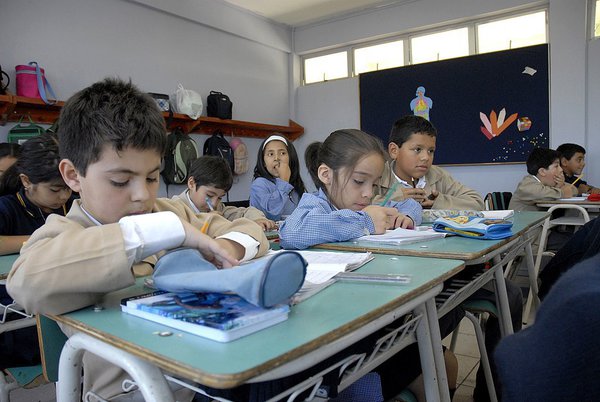The sexuality issue: Have we gone too far?
Teaching primary school children about crossdressing, homosexuality and masturbation at an age when their sexual identity has not even been formed, let alone questioned actively, allowing little boys to come to school wearing dresses, telling pre-pubescent girls about abortion... where will this end? Homophobia...no; common sense, yes!

Probably I will now receive a wave of emails calling for my head and demanding that I step down from my positions held in voluntary organizations in humanitarian projects defending the rights of LGTBQ persons to express themselves. My answer to this is I do not care about the criticism and I shall not step down because the voices of those who refuse to listen to common sense are not worth wasting time with.
Primary schools targeted
In Kenya a large number of people have written to President Uhuru Kenyatta complaining against "The World Starts with Me" computer-based program drawn up by local operators and foreign agencies. This program is part of Kenya's sexual education policy and is aimed at primary, as well as secondary school pupils, telling them that homosexuality and masturbation are means of fulfilling sexual attributes and exposing a method to control unwanted pregnancies. The program allegedly,as stated in a letter from angry parents to the Kenyan President, goes on to explore the benefits of anal and oral sex and encourages children to experiment their sexuality with individuals of their own or opposite sex.
In the UK, in March 2017 plans were introduced to teach children from the age of four upwards about safe sexual relationships, in classes called SRE (Sex and Relationships Education). In the Netherlands, C omprehensive Sex Education, talking about gender stereotypes, sexual orientation and methods of contraception, is introduced in the primary school. In fact, it is enshrined in the law in the Netherlands that all primary school students should receive some sex education.
And so the list goes on. In some countries sex education is introduced later, in others there is an option to withdraw a child from a sex education program.
Common sense
All generations have discussions about key issues and my generation has a lot of issues with its peers in Government over the last decades, which in turn have produced the world we live in: growing violence, growing poverty, pollution of the seas, land, air and even space, the imposition of the neo-liberal project through the back door as is easily seen in today's European Union and around the globe where public services have been handed over to the business sector. One good thing my generation did (I am in my fifties) was to ensure that our world is more tolerant towards persons who wish to express their sexuality.
This does not mean shocking the public by walking around crossdressed or same-sex kissing and cavorting on park benches, or even heterosexual displays of affection in public that go beyond an acceptable level. There is an expression, "Get a room". What it does mean is making sure the law protects all members of society, whether they are heterosexual, bisexual, gay, lesbian, trans-sexual, queer or whatever other orientation they wish to follow because sexuality belongs to the realm of privacy. This is, surely, common sense and nobody has the right to judge another's personal orientation.
What is not common sense, and what appears to be a clear violation of normalcy and intrusion into the human rights of a person, is what is happening today, telling children at an age at which they have not yet experienced their sexuality, and do not even understand what it means, about all sorts of practices, putting notions into their heads they might never have had. Common sense is letting primary school children be primary school children, playing, learning about the environment, concentrating on basic arithmetic witout calculators, learning their times tables properly, language, natural science, computer skills, social skills and perhaps an introduction to economics, geography and history, preferably with regular assessments by an educational psychologist and a behavioral psychologist to spot tell-tale sociopathic tendencies as they appear and correct them. And this, delivered while sitting up straight in the classroom and not slouching in a chair with half a dozen gadgets to play with, in silence and paying attention and not chatting while the teacher is speaking.
Common sense dictates that you build on these foundations as the child grows older and in today's changing world, in which the majority of high school (secondary education) pupils have had at least one sexual encounter (in my day the percentage was extremely low), introduce notions of safe sexual behavior and consent when the children reach puberty, not when they are four years old.
Common sense says that if a four-year-old boy is dressing up in his sister's clothing, he needs to be given some space, at home, in private, in his room, not prancing around the school playground in a frilly dress and panties, almost certainly getting bullied and certainly not being allowed to sit in class wearing a frock while the other children are being taught about anal sex with same-sex partners. What next?
Common sense tells us that children find these things out for themselves as they are growing up and that if they have any questions, they ask their parents or their peers and sort things out by themselves. Laying everything out in the open at too young an age surely creates confusion where it would never have existed, introduces questions which would never have been asked, and gives rise to stress and self-doubt and traumas that would never have appeared. And that is when the problems start to arise. So are we creating more problems with out misplaced permissivness than we are solving?
In 2017 where has common sense gone, and why?
Photo By Pontificia Universidad Católica de Chile from Santiago, Chile - Ocho escuelas vulnerables mejoran sus logros en lenguaje y matemática con el apoyo de Ailem UC, CC BY-SA 2.0, https://commons.wikimedia.org/w/index.php?curid=6410478
Timothy Bancroft-Hinchey
Pravda.Ru
Twitter: @TimothyBHinchey

*Timothy Bancroft-Hinchey has worked as a correspondent, journalist, deputy editor, editor, chief editor, director, project manager, executive director, partner and owner of printed and online daily, weekly, monthly and yearly publications, TV stations and media groups printed, aired and distributed in Angola, Brazil, Cape Verde, East Timor, Guinea-Bissau, Portugal, Mozambique and São Tomé and Principe Isles; the Russian Foreign Ministry publication Dialog and the Cuban Foreign Ministry Official Publications. He has spent the last two decades in humanitarian projects, connecting communities, working to document and catalog disappearing languages, cultures, traditions, working to network with the LGBT communities helping to set up shelters for abused or frightened victims and as Media Partner with UN Women, working to foster the UN Women project to fight against gender violence and to strive for an end to sexism, racism and homophobia. A Vegan, he is also a Media Partner of Humane Society International, fighting for animal rights. He is Director and Chief Editor of the Portuguese version of Pravda.Ru.
Subscribe to Pravda.Ru Telegram channel, Facebook, RSS!


